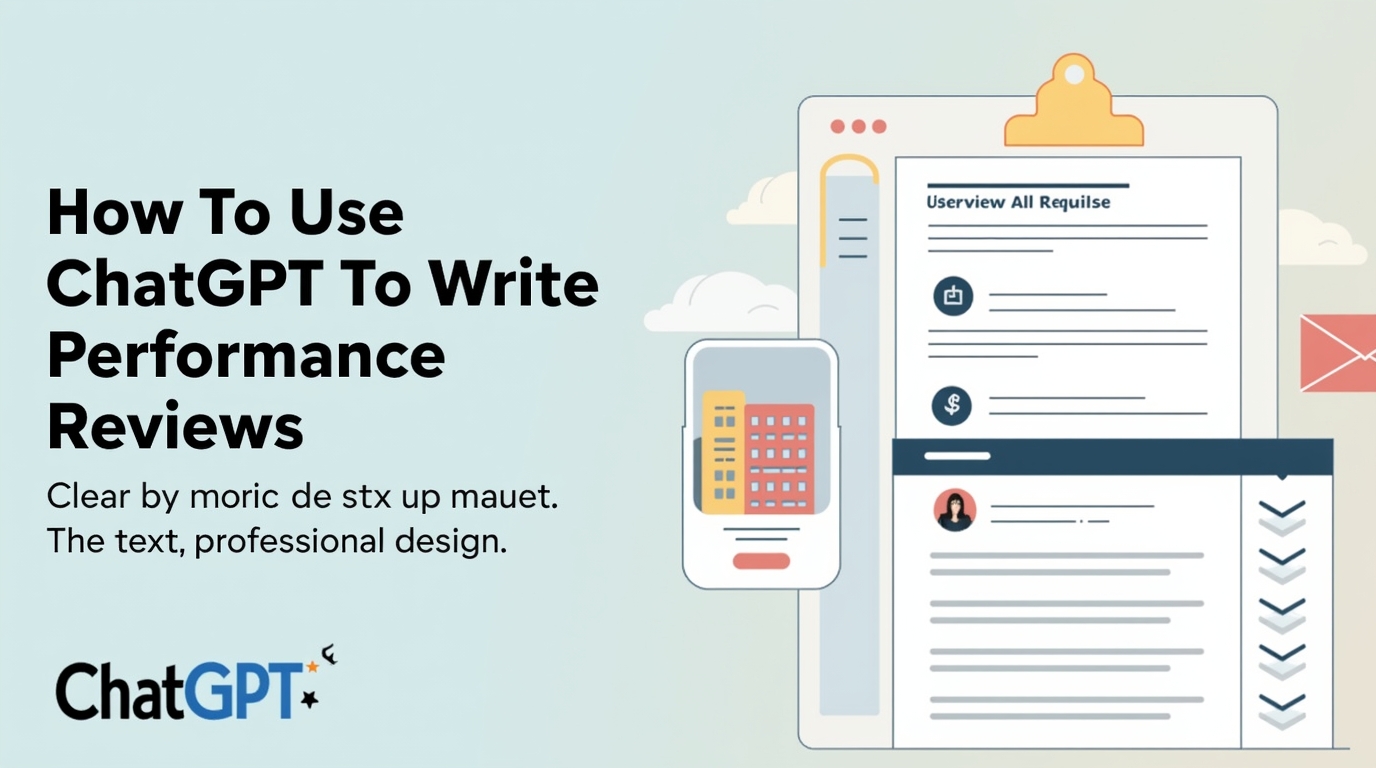Performance reviews are a key part of employee development. They help assess contributions, recognize strengths, and set goals for growth. Writing these reviews can be time-consuming, especially for managers with large teams. ChatGPT, an AI language model by OpenAI, can streamline this process by generating drafts, suggesting feedback, and proposing development goals. While ChatGPT offers significant benefits, it also has limitations, such as potential bias and privacy concerns.

Benefits of Using ChatGPT for Performance Reviews
ChatGPT can make the review process more efficient. Here are its main advantages:
- Time-Saving: Drafting reviews for multiple employees can take hours. ChatGPT generates initial drafts quickly, freeing up time for refinement.
- Consistency: AI ensures a uniform tone and structure across reviews, promoting fairness.
- Idea Generation: It suggests ways to phrase feedback or highlight achievements you might overlook.
- Data Analysis: By inputting performance data, ChatGPT can identify trends, such as consistent strengths or areas for improvement.
How to Use ChatGPT Effectively
To get the best results from ChatGPT, follow these steps:
Preparation
Before using ChatGPT, gather all necessary information:
- Compile Data: Collect notes, metrics, self-assessments, peer reviews, and your observations about the employee’s performance.
- Define Objectives: Decide the review’s purpose, such as motivating the employee, addressing performance issues, or setting new goals.
- Understand Roles: Know the employee’s job description, responsibilities, and evaluation criteria to ensure relevant feedback.
- Incorporate Values: Align feedback with your company’s values, such as teamwork or innovation.

Generating Feedback
Craft specific prompts to get useful output from ChatGPT. Here are examples:
| Purpose | Sample Prompt |
|---|---|
| Summarize Achievements | “Summarize John’s key achievements in Q1 2025, focusing on Project X.” |
| Identify Improvement Areas | “Suggest areas where Lisa can improve time management, based on team feedback.” |
| Draft Feedback | “Write a paragraph praising Mark’s problem-solving skills with a client example.” |
| Set Development Goals | “Propose three SMART goals for Sarah based on her leadership performance.” |
| Prepare Discussion Questions | “Generate open-ended questions for Emma’s career aspirations discussion.” |
Specific prompts lead to more relevant and actionable feedback.
Customizing the Output
ChatGPT’s output is a starting point. To make it meaningful:
- Add personal anecdotes or examples only you know, such as a specific project success.
- Adjust the tone to match your management style and company culture.
- Check for accuracy and remove any irrelevant or generic content.
Enhancements
ChatGPT can also help with:
- Suggesting Improvements: “Propose three ways Sarah can enhance her leadership skills.”
- Setting Goals: “Create SMART goals for Tom based on his performance review.”
- Preparing for Discussions: “Generate questions to discuss with Emma about her career goals.”
Ethical Considerations and Limitations
While ChatGPT is powerful, it has limitations that require careful attention:
- Bias: ChatGPT learns from internet data, which may contain biases. For example, it might unintentionally use stereotypical language. Always review outputs to ensure fairness.
- Data Privacy: Inputting sensitive employee information risks violating regulations like GDPR or CCPA. Avoid sharing personal details to protect privacy.
- Lack of Understanding: ChatGPT generates text based on patterns, not true understanding. Human oversight is critical to ensure feedback is accurate and appropriate.
Best Practices for Using AI in Performance Reviews
To use ChatGPT responsibly:
- Use as a Starting Point: Treat AI as a tool for drafts or ideas, not a final product.
- Always Review and Edit: Check AI-generated content for accuracy, relevance, and fairness.
- Be Transparent: Inform employees if AI is used to assist with reviews to maintain trust.
- Combine with Human Insight: Use your knowledge of the employee to personalize feedback.
Alternative Tools and Methods
ChatGPT isn’t the only option for performance reviews:
- Other AI Tools: Tools like Google’s Gemini, Microsoft’s Copilot, or Anthropic’s Claude offer similar text-generation capabilities.
- Traditional Methods: Use manual writing, HR templates, or consult with HR professionals for a fully human approach.
- Hybrid Approach: Combine AI drafts with human edits for efficiency and personalization.
Final Thoughts
ChatGPT can transform the performance review process by saving time and providing structured feedback. However, it’s not a replacement for human judgment. By using specific prompts, reviewing outputs for bias, and protecting employee privacy, managers can create reviews that are both efficient and meaningful. Combining AI with personal insights ensures reviews are fair, accurate, and aligned with organizational goals. As AI tools evolve, staying informed about their capabilities and limitations will help you use them responsibly in HR tasks.
FAQs
- Is it ethical to use ChatGPT for performance reviews?
It can be ethical if used responsibly. Always review AI content for bias and ensure it aligns with factual data. - Can ChatGPT replace managers in writing performance reviews?
No, ChatGPT should assist, not replace, managers. Human judgment is essential for meaningful feedback. - How can I ensure AI-generated feedback is unbiased?
Carefully review outputs, remove stereotypical language, and base feedback on verified data. - What are some good prompts for ChatGPT in performance reviews?
- “Summarize [Employee’s] achievements in [time period].”
- “Identify areas for improvement for [Employee].”
- “Suggest SMART goals for [Employee] based on strengths.”
- Are there risks with using ChatGPT for performance reviews?
Risks include bias, privacy concerns, and inaccurate content if not properly reviewed.
